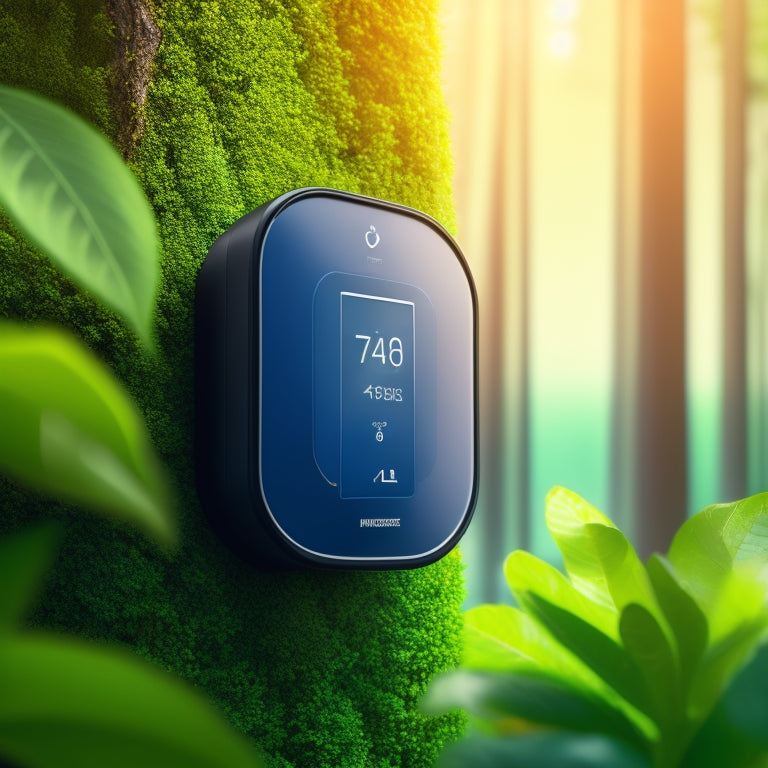
7 EV-Friendly Thermostats for Energy-Savvy Homeowners
Share
You're looking for an eco-friendly thermostat that syncs with your electric vehicle and optimizes your home's energy usage. You've come to the right place! From brands like Honeywell and Nest, there are various models that offer advanced features like temperature sensors, programmable settings, and smart scheduling. These thermostats can integrate with your EV, renewable energy sources, and smart home devices to reduce energy waste and lower your bills. You'll even find thermostats with real-time monitoring and alerts to help you make data-driven decisions. To find the perfect fit for your energy-savvy home, investigate the options and features that'll take your energy efficiency to the next level.
Key Takeaways
- EV-friendly thermostats optimize home energy usage by aligning charging schedules with daily routines and avoiding peak hour electricity demand.
- Some thermostats, like Honeywell and Nest, offer advanced features like temperature sensors, programmable settings, and learning algorithms for precise energy control.
- Integration with renewable energy sources, such as solar power systems, can maximize energy savings and reduce bills by up to $2,000 annually.
- Real-time monitoring and control capabilities enable homeowners to track energy usage, identify inefficiencies, and make data-driven decisions to reduce waste.
- Smart scheduling and time-of-use pricing strategies help avoid peak hour electricity demand, reducing strain on the grid and lowering electricity bills.
Eco-Friendly Thermostat Options
When you're shopping for an eco-friendly thermostat, you'll find a range of options that cater to different needs and budgets.
You'll come across well-known thermostat brands like Honeywell and Nest, which offer energy-efficient models with advanced temperature sensors. These sensors can detect even slight changes in temperature, ensuring your home stays comfortable while minimizing energy waste.
Some eco-friendly thermostats also come with features like geofencing, which can automatically adjust the temperature based on your location. Many homeowners are now opting for sustainable charging solutions to reduce their carbon footprint.
Additionally, some thermostats can integrate with renewable energy sources, such as solar power, to further minimize energy waste. By choosing an eco-friendly thermostat, you'll not only reduce your carbon footprint but also save on your energy bills.
Research and compare different models to find the one that best fits your needs and budget.
Smart Thermostats for EV Owners
Your electric vehicle (EV) is a significant investment in reducing your carbon footprint, and pairing it with a smart thermostat can take your eco-friendliness to the next level.
By integrating your EV with a smart thermostat, you can optimize your home's energy usage and reduce waste. Look for thermostats with smart home integration, allowing you to control temperature, lighting, and security systems from a single interface.
Additionally, incorporating renewable energy sources, such as solar energy, can further minimize your carbon footprint and lower operating costs.
User-friendly interfaces make it easy to program and adjust settings, ensuring you're in control of your energy consumption.
With real-time monitoring and customizable alerts, you'll stay on top of your energy usage and make data-driven decisions to minimize your environmental impact.
Energy-Efficient Temperature Control
Advanced temperature control features in EV-friendly thermostats guarantee that your home's heating and cooling systems are optimized for maximum energy efficiency. You can enjoy the freedom to customize your home's temperature with features like zoned heating, where you can control the temperature in different areas of your home. This means you can heat or cool only the areas that need it, reducing energy waste.
| Feature | Description | Benefit |
|---|---|---|
| Programmable Settings | Schedule temperature changes throughout the day | Save energy when you're not home or when you're sleeping |
| Zoned Heating | Control temperature in different areas of your home | Reduce energy waste by only heating/cooling areas that need it |
| Smart Scheduling | Automatically adjust temperature based on your daily routine | Optimize energy usage and save money on your utility bill |
Optimizing Home Charging Sessions
When you own an electric vehicle, optimizing home charging sessions is essential to reduce your energy bills and minimize your carbon footprint.
You can do this by creating smart charging schedules that align with your daily routine, ensuring your car is fully charged when you need it. By avoiding peak hours and charging during off-peak hours, you'll not only save money but also reduce strain on the grid.
For instance, using solar-powered charging stations can lead to potential annual savings of $500 to $2,000+, further reducing your energy costs.
Smart Charging Schedules
Set your electric vehicle's charging schedule to maximize efficiency and convenience with smart charging schedules.
You can program your charging sessions to occur when energy demand is low, reducing strain on the grid and your electricity bill. By leveraging federal incentives, you can further offset the costs of EV adoption and benefit from tax credits, grants, and low-interest loans.
Smart grid integration enables your EV charger to communicate with the grid, optimizing charging times based on energy availability. By participating in demand response programs, you can earn incentives for charging during off-peak hours.
This not only benefits your wallet but also helps stabilize the grid. With smart charging schedules, you'll enjoy the freedom to charge your EV when it's most convenient and cost-effective for you.
Take control of your energy usage and make the most of your EV-friendly thermostat.
Peak Hour Avoidance
Your EV-friendly thermostat helps you sidestep peak hour chaos by optimizing home charging sessions. This feature is essential in electricity demand management, as it reduces the strain on the grid during peak hours.
By avoiding peak hours, you not only save energy but also reduce your electricity bill. In fact, upgrading electrical infrastructure and grid capacity Electrical Infrastructure Upgrades is vital to support increased power demand and prevent outages.
Additionally, peak demand management strategies distribute power effectively during high usage.
Smart scheduling: Your thermostat can schedule charging sessions during off-peak hours when electricity rates are lower.
Time-of-use pricing: Your thermostat adjusts charging sessions based on time-of-use pricing, ensuring you pay the lowest rates.
Load balancing: Your thermostat distributes charging sessions across multiple EVs, preventing overload on the grid.
Real-time monitoring: Your thermostat continuously monitors electricity demand, adjusting charging sessions to avoid peak hours.
Thermostats With EV Charging Scheduling
Smart home integration takes your electric vehicle (EV) ownership experience to the next level with thermostats that support EV charging scheduling.
These advanced thermostats allow you to optimize your EV's charging schedule, ensuring that your vehicle is fully charged when you need it. By integrating with your charging station, you can schedule charging during off-peak hours, reducing strain on the grid and saving you money on your energy bill.
With thermostat compatibility, you can seamlessly connect your EV to your smart home system, giving you full control over your energy usage.
Integration With Solar Power Systems
You're likely aware that solar power systems can greatly reduce your energy bills, but did you know that EV-friendly thermostats can take it a step further?
By integrating with your solar panel system, these thermostats can synchronize energy usage with energy harvesting, ensuring that you're using the cleanest, most efficient energy possible.
This optimized energy harvesting allows you to make the most of your solar power investment.
Solar Panel Syncing
With the increasing adoption of solar power systems, it's essential to optimize energy consumption and production. As a homeowner, you want to guarantee that your solar panel system is working in harmony with your thermostat.
Solar panel syncing allows you to do just that. By integrating your solar power system with your thermostat, you can optimize your energy usage and production. Here's how:
-
Maximize self-consumption: Use the energy generated by your solar panels to power your home, reducing your reliance on the grid.
-
Take advantage of renewable energy incentives: Many governments offer incentives for homeowners who generate their own renewable energy.
-
Optimize solar energy management: Your thermostat can help you manage your energy usage and production in real-time, confirming you're getting the most out of your solar panel system.
- Increase energy independence: By syncing your solar panel system with your thermostat, you can reduce your dependence on the grid and enjoy greater energy freedom.
Optimized Energy Harvesting
As you integrate your solar power system with your thermostat, optimized energy harvesting becomes a critical aspect to evaluate. This guarantees you maximize your energy independence and reduce reliance on the grid. With an EV-friendly thermostat, you can monitor and control your energy usage in real-time, making adjustments to optimize your energy harvesting.
| Energy Management Feature | Benefits for Sustainable Living |
|---|---|
| Real-time energy monitoring | Identify areas of energy inefficiency and make data-driven decisions |
| Automated energy optimization | Maximize energy harvesting during peak solar hours |
| Smart charging for EVs | Charge your vehicle when energy is abundant and cheap |
| Energy storage integration | Store excess energy for later use, reducing waste and grid dependence |
Wi-Fi Enabled EV-Friendly Thermostats
One key benefit of Wi-Fi enabled EV-friendly thermostats is their ability to learn your schedule and preferences, allowing them to optimize your home's temperature when you're not around or when your electric vehicle is charging.
This means you can enjoy a comfortable home while minimizing energy waste and reducing your energy bills.
Some notable Wi-Fi benefits of these thermostats include:
-
Remote access: Control your thermostat from anywhere using your smartphone or tablet.
-
User-friendly interfaces: Easily maneuver and adjust settings with an intuitive app or web portal.
-
Energy monitoring: Track your energy usage and identify opportunities for cost savings.
- Smart home compatibility: Seamlessly integrate with other smart devices for a more automated home.
Frequently Asked Questions
Can I Install an Ev-Friendly Thermostat Myself or Do I Need a Professional?
Just like a skilled builder constructs a sturdy foundation, you're wise to evaluate DIY installation versus professional assistance for your thermostat. While you can try a DIY approach, complex systems may require a pro's knowledge to guarantee a seamless, energy-efficient setup.
Will an Ev-Friendly Thermostat Work With My Existing HVAC System?
You'll want to check your HVAC system's compatibility with the thermostat's features, such as voltage, wiring, and communication protocols, to guarantee a seamless integration; most modern thermostats are designed to work with standard HVAC systems, but it's crucial to verify compatibility before installation.
Do Ev-Friendly Thermostats Require a Dedicated 240-Volt Charging Station?
Like a puzzle piece fitting snugly into place, you'll find that EV-friendly thermostats don't necessarily require a dedicated 240-volt charging station. Instead, they optimize your existing charging infrastructure for seamless energy management, giving you the freedom to charge your EV with ease.
Can I Use an Ev-Friendly Thermostat With a Non-Ev Vehicle?
You can use an EV-friendly thermostat with a non-EV vehicle, as it's designed for vehicle compatibility. The thermostat's features, like smart scheduling and energy monitoring, will still benefit you, even if you don't own an electric vehicle.
Are Ev-Friendly Thermostats Compatible With Other Smart Home Devices?
You'll be thrilled to know that 70% of smart homes already integrate thermostats with other devices! EV-friendly thermostats seamlessly connect with your smart home setup, streamlining energy management and optimizing your space for comfort and efficiency.
Related Posts
-

3 Best Solar-Powered Biodegradable Accessories for Your Home
You're taking a significant step towards a more sustainable lifestyle by incorporating solar-powered biodegradable ac...
-

Why Grow Up? Vertical Gardens Transform Urban Living
As you change your urban living space, you're not just growing up - you're bringing nature back into the heart of the...
-

7 Top HEPA Filters for Green Building Projects
You need a reliable HEPA filter for your green building project that aligns with your sustainable goals and guarantee...


